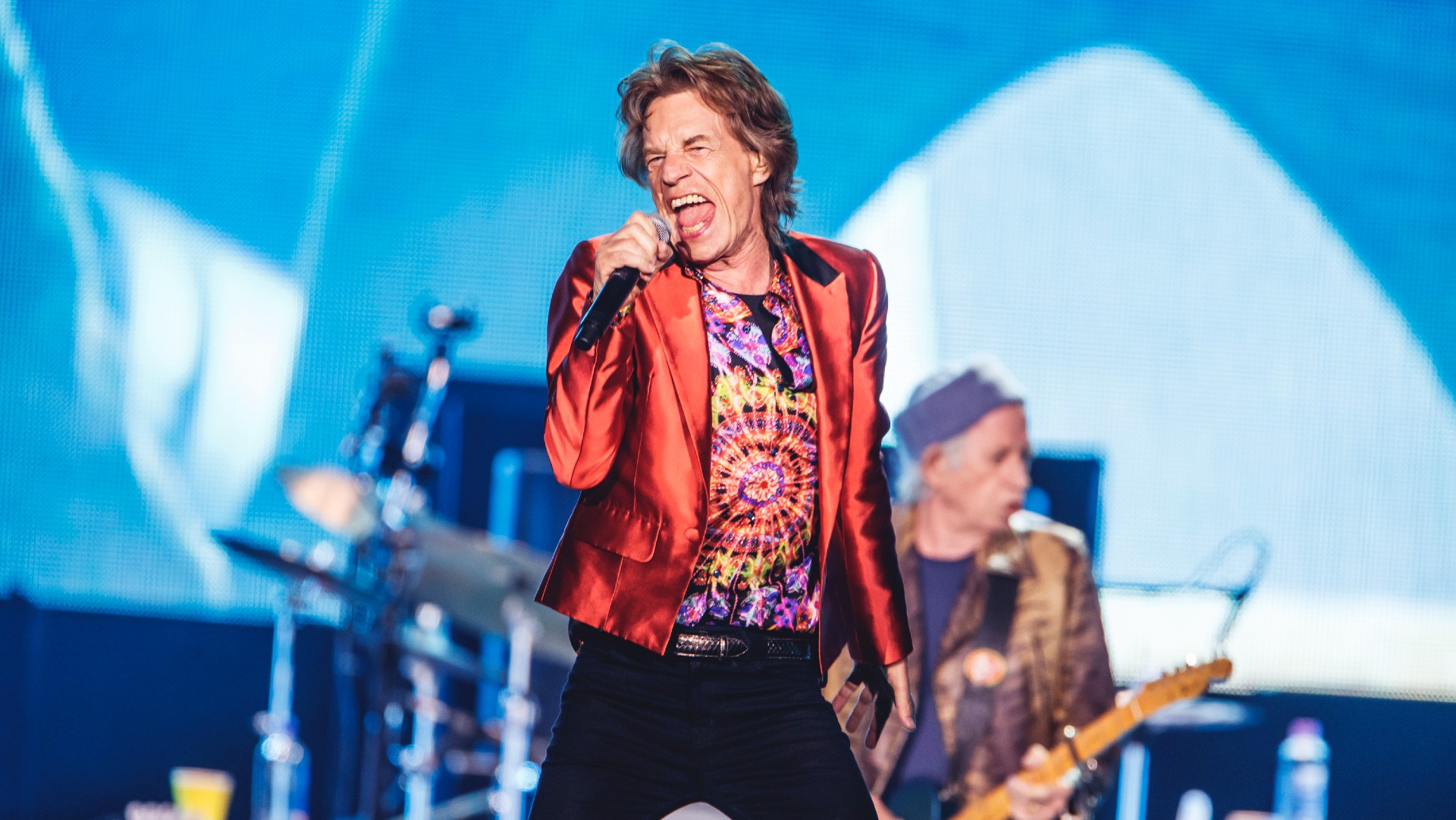A Night of Rock and Unity
Midway through The Rolling Stones’ electrifying set in Los Angeles, the night nearly took an unexpected turn.
A small group near the front began chanting anti-American slogans, their voices breaking through the music and drawing uneasy attention from thousands in the arena.
For a moment, tension rippled through the crowd. All eyes shifted to the legendary frontman, waiting to see how he would respond.
But instead of lashing out or walking offstage, Mick Jagger did something extraordinary.
He gripped the microphone, fixed the crowd with that unmistakable Jagger intensity, and softly began to sing: “God Bless America.”
At first, it was only him-the raspy, iconic voice that has defined rock ‘n’ roll for over half a century, steady and resolute.
Then the moment transformed.
Within seconds, more than 25,000 voices rose with his, filling the arena in a thunderous chorus that seemed to shake the night sky itself.
Flags waved. Lighters flickered. Tears ran down faces.
And the chants that once threatened to divide the night faded into silence-overpowered by unity, music, and the power of one man’s song.

The Power of Music Over Division
For decades, Mick Jagger has been the embodiment of rebellion, freedom, and pure rock energy.
Yet on this night, he proved something deeper-that music has the power to unite even in the face of division.
By choosing to sing God Bless America,” a song outside his usual rock catalogue, Jagger transformed what could have been a moment of chaos into one of the most powerful and unifying experiences in recent concert history.
Fans in attendance described the scene as “spiritval,” “unforgettable,” and “a reminder that legends lead with grace, not rage.”
Social media platforms exploded with clips of the crowd belting the patriotic anthem alongside Jagger.
One fan wrote on X (formerly Twitter): “I came for rock, but | left with goosebumps.
Jagger reminded us why he s not,ust a performer -he’s a leader.”

A Symbolic Choice From a Global Icon
Though Mick Jagger is British, his deep connection with America is undeniable.
The Rolling Stones built much of their global legacy in the United States, and American audiences have embraced Jagger as one of their own.
Singing “God Bless America” was more than a spur-of-the-moment decision-it was a symbolic gesture of solidarity with his fans, showing respect for the country that helped elevate his career.
Music historians note that the choice also highlighted the universal language of music.
‘n an age when division dominates headlines, Jagger’s act reminded the world that a song can sometimes do more than speeches, debates, or arguments ever could.
/i.s3.glbimg.com/v1/AUTH_da025474c0c44edd99332dddb09cabe8/internal_photos/bs/2024/A/O/HRo8hKRXufPPGMJMZwSg/103775955-mick-jagger-of-the-rolling-stones-performs-on-stage-at-johan-cruijff-arena-amsterdam-nethe.jpg)
Fans and Critics React
The performance quickly made international headlines. uritics praised Jagger’s composure, noting that many artists might have chosen confrontation over calm.
Instead, Jagger displayed maturity, leadership, and the kind of charisma that has kept him at the top of music for over six decades.
Fans who were present at the Los Angeles concert shared emotional accounts of the moment.
“It felt like we were all one voice,” said Maria Lopez, a lifelong Stones fan.
“You don’t forget something like that. It wasn’t just a concert-it was history.”
Jagger’s Legacy of Unpredictability
Mick Jagger has built his reputation on unpredictability-whether it’s his flamboyant stage presence, his rebellious lyrics, or his larger-than-life personality.
But last night’s surprise wasn’t about shock value or theatrics.
It was about leadership, grace, and the ability to rise above noise with something greater: music.
This performance adds to Jagger’s long list of unforgettable moments.
From the Stones’ iconic shows at Madison Square Garden to historic concerts like Altamont and Hyde Park, Jagger has always commanded stages with power.
But in Los Angeles, he showed that sometimes the juietest moments can be the loudest.

Conclusion: A Lesson in Grace and Unity
In an era when anger often drowns out reason, Mick Jagger’s decision to sing “God Bless America” was more than a performance-it was a lesson.
He reminded his fans and the world that true leadership doesn’t come from shouting down opposition but from lifting voices higher than division.
For the 25,000 people who sang with him that night, it wasn’t just another concert-it was a reminder of why Jagger remains one of the most respected, influential, and beloved figures in music history.
Mick Jagger didn’t just silence protests-he turned them into harmony. And that is the mark of a legend.
Los Angeles has seen countless unforgettable performances, but last night, at a packed arena of 25,000 fans, Derek Hough delivered a moment that will live far beyond the world of dance.
Known worldwide as the “Dancing with the Stars” legend, Hough stunned his audience not with choreography or spectacle, but with a simple act of courage and grace an act that turned tension into unity, and protest into patriotism.